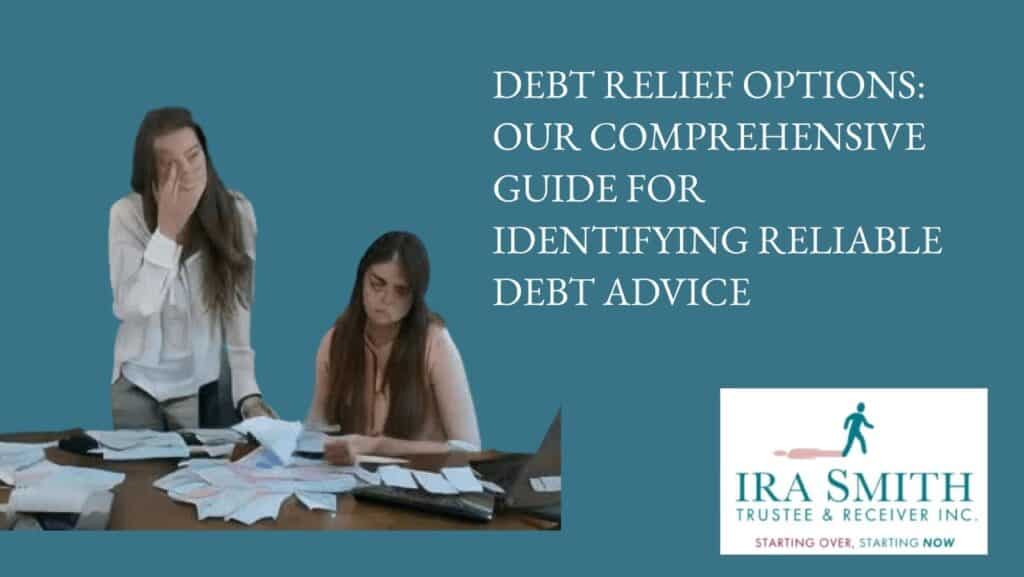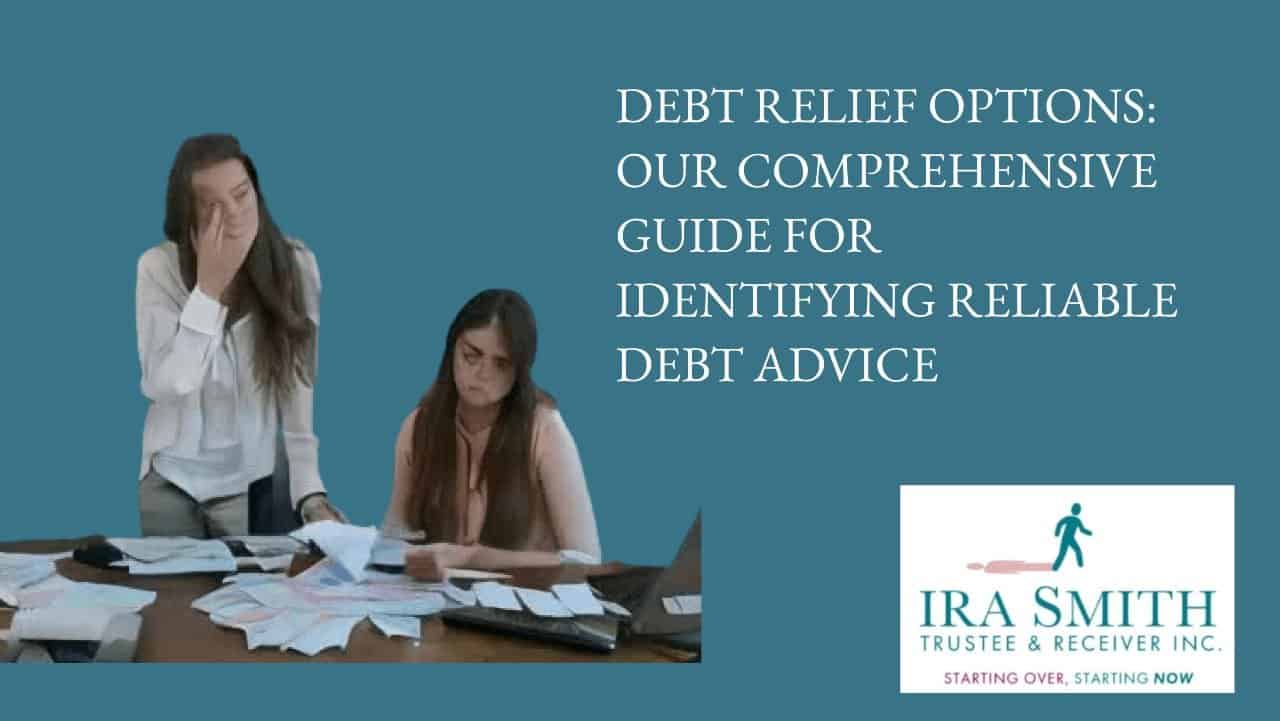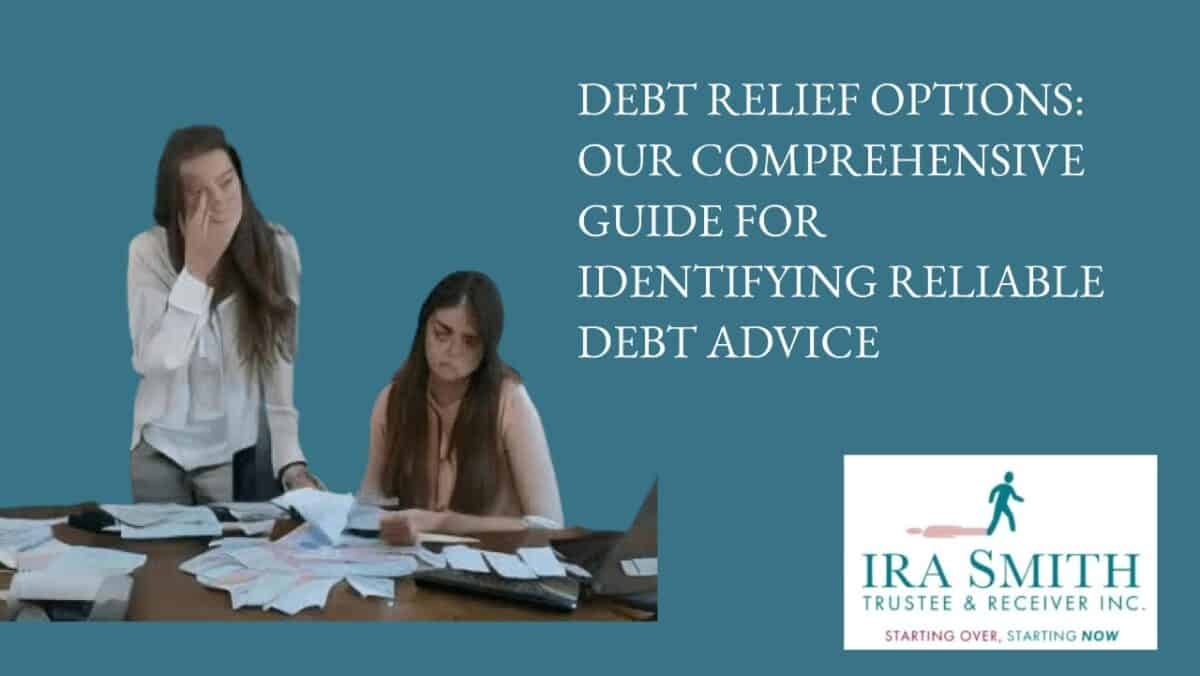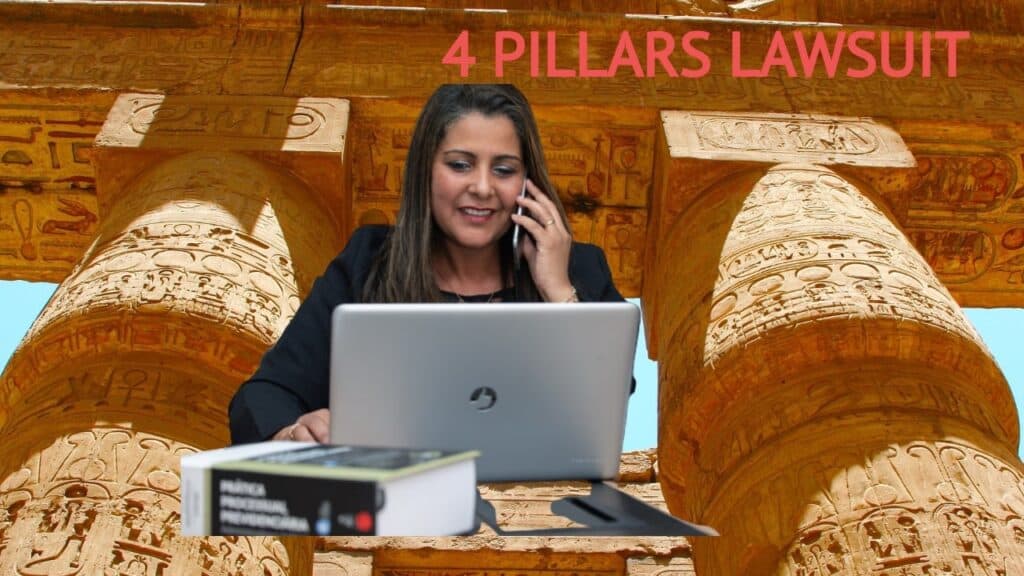Debt relief options: Introduction
Suppose you ever find yourself overwhelmed by the weight of excessive financial responsibilities. In that case, it becomes crucial to seek trustworthy recommendations for selecting a reliable service provider who can assist you with various options to alleviate your financial debts and provide you with the most beneficial financial guidance. Amidst the vast array of available assistance choices, it might seem daunting to pinpoint genuine resources that can genuinely assist you without any hidden agendas. It holds great significance for your future well-being to be able to distinguish between deceitful scammers and genuine helpers.
Fear not, for there exists an infinite realm of dependable suppliers specializing in financial debt relief options eagerly awaiting your discovery. From the information in this Brandon’s Blog, you can boldly conquer your present economic challenges, obtain the appropriate assistance from the right individuals, and make well-informed decisions that will emancipate you from the shackles of debt -Starting Over, Starting Now!
Debt relief options: What is debt relief?
Debt relief encompasses a myriad of technical strategies and detailed processes designed to lessen or eradicate the weighty load of unresolved financial obligations for individuals and businesses. It entails the implementation of deliberate and targeted measures to alleviate the pressing strain on one’s economic well-being, engage in negotiations for the revision of loan terms, or reach mutually agreeable resolutions with creditors.
Debt relief options take on many diverse forms, including but not limited to debt consolidation, the pursuit of debt settlements, the formulation and execution of comprehensive debt management plans, and, in the most dire circumstances, the contemplation of bankruptcy as an ultimate solution.
The overarching objective that underpins the concept of all debt relief options is to furnish individuals or entities with a revitalized opportunity, empowering them to reclaim a solid footing in their fiscal affairs, reinstating stability, and propelling them toward a more tenable and enduring financial equilibrium.

Debt relief options: Why managing debt is crucial
In today’s modern society, more and more Canadian households are struggling with debt. The prevalence of indebtedness has emerged as an unsurprising reality in the lives of numerous individuals. From the weighty load of educational loans to the looming presence of bills linked to credit cards, the accumulation of debts can swiftly escalate and become overwhelming if not effectively handled.
The management of indebtedness is not solely a matter of personal responsibility but a skill that can yield a profound impact on one’s financial well-being and prospects for the future. By grasping the significance of debt management, individuals can make well-informed decisions concerning their finances, elude the treacherous clasp of debt cycles, and ultimately achieve lasting financial stability.
Efficiently handling indebtedness is vital in safeguarding your financial freedom. Uncontrolled debts can result in missed payments, penalties, exorbitant interest rates, and even bankruptcy. Debt management ensures that you retain control over your finances and empowers you to take charge of your own life. Seeking guidance from reliable professionals specializing in debt relief will furnish you with practical options tailored to your unique financial situation, enabling you to resolve your debt issues. Hence, skillfully managing your debts is paramount in establishing a solid financial foundation.
Given its implications on credit ratings, financial independence, and overall peace of mind, the management of indebtedness assumes critical importance. Whether you are a recent graduate burdened with educational loans, a homeowner grappling with a mortgage, or simply an individual juggling multiple credit card bills, this article on Brandon’s Blog is specifically crafted to cater to your needs.
Debt relief options: Office of the Superintendent of Bankruptcy (Canada)
On the 27th of June of this year, a notice was issued by The Office of the Superintendent of Bankruptcy (OSB), stressing the significance of understanding the perils associated with the unregulated Debt Advisory Marketplace, while simultaneously aiding consumers in identifying trustworthy sources of debt assistance.
One must bear in mind that unregulated advisors have the potential to impose exorbitant charges, varying from a few hundred dollars to several thousand dollars, for services that they are not legally permitted to offer. Furthermore, they may demand payment for redundant or repetitive services both prior to, during, and subsequent consultations.
In order to safeguard oneself from deceptive schemes, it is highly recommended to exercise prudence and seek guidance from duly authorized and regulated professionals.

Debt relief options: The difference between good and bad debt relief service providers
If you find yourself inundated with mounting financial obligations and in search of a way out, rest assured that you are not alone in this predicament. It is not uncommon for individuals to confront economic difficulties that can result in substantial levels of indebtedness. Nevertheless, it is crucial to bear in mind that there are avenues accessible to assist you in regaining command over your fiscal circumstances.
Debt relief service providers can play a pivotal role in facilitating your journey toward financial stability. However, it is of utmost importance to distinguish between reputable and unscrupulous providers. The ensuing discussion will delineate the characteristics that set reputable debt relief service providers apart from those who may not have your best interests at heart. By comprehending these distinctions, you will be empowered to make an astute decision and select a provider that genuinely aids you in your choice of debt relief options for accomplishing your financial objectives.
When embarking on your quest for debt relief options, it is imperative to identify trustworthy sources. Trustworthy debt relief service providers exhibit transparent fee structures and refrain from making grandiose promises to their clients. Additionally, they boast a dependable accreditation program, thereby ensuring the credibility of their services. Conversely, unscrupulous debt relief service providers make untenable pledges and levy concealed fees, exacerbating the accumulation of debt. Armed with this understanding, individuals can safeguard themselves against dubious service providers and reclaim control over their financial affairs.
I shall delve into the significance of credibility, transparency, experience, and success rates when it comes to selecting a debt relief service provider.
Debt relief options: Factors to consider when choosing a debt relief service
Certification and accreditation of the debt relief service provider
When it involves seeking support with handling as well as decreasing your financial debts, it is crucial to work with professionals that are accredited, licensed and supervised by a government body. This is where accreditation and certification play a significant function.
By choosing a financial debt relief service provider that is licensed as well as well-recognized, you can have satisfaction knowing that you are working with a respectable company that complies with licensing requirements, market criteria and best practices. Qualification and certification ensure that the service provider fulfills detailed standards as well as possesses the needed knowledge to provide you with the full range of debt relief options and financial advice and successfully help you manage your financial debt. Furthermore, they guarantee that the solution abides by relevant regulations, legislation and standards.
In today’s financial landscape, rip-offs, as well as unethical practices, exist, making it vital to shield on your own and also make informed choices. By going with a certified and accredited financial debt relief professional, you can rely on that the professionals you are collaborating with have undergone rigorous training as well as satisfy the highest possible requirements in the market.
Throughout this blog post, we will delve into the importance of certification and accreditation, the benefits they offer, and how they can assist you in making informed decisions when selecting a debt relief service provider. Whether you are considering credit counselling, debt consolidation, or debt settlement, understanding the significance of certification and accreditation will empower you to navigate the complex world of debt relief with confidence.
Join us as we explore this topic in detail and equip you with the knowledge you need to make the best choices for your financial well-being. It’s time to take control of your financial future and choose a debt relief service provider that has your best interests at heart.
Transparent fee structure
Dealing with the issue of debt can elicit an overwhelming and stressful encounter; nevertheless, collaborating with a distinguished debt alleviation firm can offer respite from the burden. However, it is crucial to exercise caution when opting for a debt alleviation firm, as not all firms are forged equally. One pivotal aspect to contemplate is the firm’s fee framework, as any esteemed debt alleviation firm must possess a transparent fee framework that is effortlessly understandable and does not obscure any covert expenses.
Transparency constitutes an essential constituent of debt alleviation services, as consumers merit a lucid comprehension of the expenses and potential outcomes linked to the rendered services. An esteemed debt alleviation firm will provide an all-encompassing breakdown of all fees associated with their services, encompassing upfront fees, monthly fees, and success fees. Moreover, they ought to provide upfront disclosure about any prospective risks or limitations associated with their services, rather than proffering unrealistic promises or guarantees.
Customer reviews and rating
One crucial factor to consider when selecting a debt relief service is customer reviews and ratings. A professional debt relief company will provide genuine reviews and ratings of their services from their satisfied clients. By looking at these reviews and ratings, you can discern whether the debt relief service has a history of delivering results and exceptional customer service. High ratings and positive reviews are typically an indication that the company has a reputable track record of helping individuals get out of debt. Therefore, it is vital to do your research and make sure you choose a company that has a proven history of delivering excellent results.

Debt relief options: Tips for managing your debt
Below are my best tips for finding debt solutions:
Credit counselling
Using a community-based non-profit credit counselling agency to address consumer debt difficulties can generate numerous benefits. Below are some vital advantages to take into consideration:
Professional Support: These agencies used trained and licensed credit counsellors that possess considerable expertise in personal money and debt restructuring. They can supply valuable suggestions customized to your specific situation, providing a tailored plan to conquer your financial debt challenges.
Financial Guidance and Education: These community-based credit counselling agencies regularly offer support for budgeting and deliver programs that concentrate on financial literacy. By collaborating with such an agency, you can learn how to create a budget plan, focus on expenditures, and also develop sustainable financial methods. Improving your financial literacy will enable you to make informed decisions as well as stop possible future debt problems.
Debt Management Plans: These agencies may offer Debt Management Programs (DMPs) as a feasible service for settling your financial obligations. Via a DMP, the agency bargains with your creditors to lower rates of interest, waive charges and develop a consolidated payment plan. This strategy can make the process of financial debt settlement more convenient as well as accelerate your progress toward ending up being debt-free.
Financial Institution Relationships: These non-profit credit counseling agencies have actually developed links with a range of financial institutions being the banks and credit unions. Because of this, they might be able to properly work out useful terms and payment options for you, thereby decreasing interest rates to an affordable annual percentage rate and also month-to-month payments.
Emotional Support: All debt relief options can be challenging and mentally draining as you work your way through them. Community-based credit counselling agencies understand the psychological toll that money difficulties can have on people and their households. They cultivate a helpful environment where you can honestly reveal your worries as well as get experienced advice. This enables you to really feel much more empowered and inspired to conquer your financial obstacles.
Non-profit Status: These agencies run as nonprofit organizations and place a top priority on assisting people in need rather than producing profits. They typically provide their solutions for small fees, or in many cases, free of charge. This makes their solutions much more available and also budget-friendly for those experiencing financial difficulties. We always recommend using non-profit community-based debt counselling firms as one of the debt relief options that can be utilized. We never suggest utilizing financial debt settlement for profit companies.
Confidentiality and Privacy: These community-based agencies focus on client confidentiality and privacy. They take great care with your personal financial information and also make sure that individual details are kept safe and secure.
Debt consolidation
Debt consolidation is a preferred choice for individuals looking to combine numerous debts into one manageable debt with a single monthly payment. This debt relief option entails getting a single loan that can repay all of your existing financial obligations. This one personal loan is at a lower interest rate than the average interest rate charged on all your current outstanding debts and streamlines the settlement process.
Nevertheless, it is essential to carefully weigh the benefits and drawbacks of debt consolidation and the terms of all debt consolidation loans being offered to you. Look for a trusted financial partner, evaluate the terms and costs related to the consolidation loan, and consider your ability to stay current with the brand-new repayment timetable. With the appropriate approach, financial debt consolidation can be a wise technique for taking control of your funds.
Individuals have several choices when it pertains to combining debt. The concept is that either:
- your credit history is good enough so that you can obtain an unsecured loan; or
- you are choosing to use security for the loan.
For example, you may have 5 charge cards all with unpaid debts. You are pressing the upper limits of your authorized credit and the interest rates are very high. If you can get a home equity line of credit at a much lower annual interest rate, the benefit is evident. So it would be a clever option to use security to get a consolidation loan.
If you didn’t intend to or really did not have security to provide, you may have a good enough credit score to obtain an unsecured loan. If you can get this sort of funding, the annual interest rate charged will be more than for a secured loan, but still much less than you are paying on your credit cards. So this too would be a smart method to go with.
Debt settlement
Debt settlement is a debt relief choice that includes working out with your creditors an arrangement to pay them less than the total you owe them in order to settle all your financial debts for less than what is owed. This option can help to reduce your total financial debts into amounts that you can repay and prevent you from needing to file for bankruptcy.
Nevertheless, it ought to be noted that this debt relief option can have a negative impact on your credit rating and may cause taxable income obligation effects if any of the debts you are comprising were taken on to earn income. This option is best for those who have just a few creditors and have the financial literacy ability and are not afraid to contact and negotiate with their creditors on their own.
If you don’t believe you can do it on your own, stay away from the for-profit debt settlement companies as they are not looking out for your best interests. The best way to do a debt settlement plan if you are not confident that you can do it on your own is either the DMP described above, or a consumer proposal, described below.
Consumer proposal
If you’re battling with financial debt, a consumer proposal may be a great debt settlement plan for you. This debt relief solution is a legal process carried out under the Bankruptcy and Insolvency Act (Canada) (BIA). It enables you to pay back part of your debt over time. The benefit to you of a consumer proposal is that as soon as you end up repaying the part that you agreed to, you will be totally debt-free. The unpaid balance is eliminated too.
To get this government-sanctioned financial debt settlement strategy, you need to be insolvent and also have unsecured debts of $250,000 or less owing to all your unsecured creditors (omitting any type of secured debts registered against your personal residence such as mortgages or lines of credit).
This type of repayment plan is a good choice for people who are:
- Employed;
- can budget plan their money to make the required month-to-month regular payments;
- want to avoid and choose the best alternative to bankruptcy; and
- can’t stand all the collection calls from the debt collectors any longer.
Under the BIA, a licensed insolvency trustee (previously called a bankruptcy trustee) is the only party allowed under Canadian law to administer a consumer proposal. The licensed insolvency trustee is named the consumer proposal administrator.
The licensed insolvency trustee will submit the needed documents to the OSB. All interest charges and all collections calls stop on the day you file your consumer proposal. You can take up to 5 years to pay the amount promised under your consumer proposal.
When you submit a consumer proposal, any legal action your unsecured creditors have actually started against you is frozen and stopped. That goes for any legal action any of your creditors were threatening to start also. If a creditor currently has a judgment against you and is having your wages garnisheed, that stops too. You get that legal protection by making an insolvency filing under the BIA.
The licensed insolvency trustee who oversees your consumer proposal is responsible for negotiating with your unsecured creditors to reduce your unsecured original debts on your behalf. Upon successful acceptance of your proposal by the required majority of your creditors, you will be obligated to make monthly payments as per the agreed-upon terms of the proposal. You make your one monthly payment to the licensed insolvency trustee who takes care of making the promised payments to creditors.
Bankruptcy
Bankruptcy is a legal recourse that enables individuals or companies to discharge or restructure their financial liabilities. While it is the last option anyone should consider in the hierarchy of debt relief options, bankruptcy may be the most appropriate solution in certain circumstances.
It is crucial to weigh the consequences and benefits before opting for bankruptcy. A seasoned licensed insolvency trustee can guide you through the process and provide insights on the other debt relief options mentioned earlier.
Bankruptcy should not be taken lightly. Nevertheless, if carefully considered and implemented, it can offer a fresh start and an opportunity to rebuild credit scores for a stronger financial future.
I will not delve into the intricacies of the bankruptcy process and its workings in this Brandon’s Blog post. If you need to learn more about the bankruptcy process and if it is right for you, call me.

Debt relief options: Conclusion
Managing financial debt can indeed be a difficult as well as emotionally draining experience. However, there are reliable sources offered to give guidance and support. When looking for assistance with debt problems, I recommend 2 trusted resources: non-profit community-based credit counselling agencies and licensed insolvency trustees. Stay away from a for-profit debt settlement company.
I hope you enjoyed this debt relief options Brandon’s Blog. Financial stress is a growing concern in Canada, affecting individuals of all ages and income levels.
Creating a solid financial plan can be the key to unlocking a brighter and more prosperous future. By taking control of your finances, you can prioritize your expenses, set clear financial goals, and build a strong foundation for your dreams to come true. With the right mindset and approach, financial planning can empower you to regain control, eliminate this issue as a source of stress in your life and find peace of mind.
Individuals must take proactive measures to address financial difficulties and promptly seek assistance when necessary. It is crucial to recognize that financial stress is a prevalent concern and seeking help is a demonstration of fortitude, rather than vulnerability. Should you encounter challenges in managing your finances and find yourself burdened by stress, do not delay in pursuing aid.
Revenue and cash flow shortages are critical issues facing people, entrepreneurs and their companies and businesses that are in financial distress. Are you now worried about just how you or your business are going to survive? Are you worried about what your fiduciary obligations are and not sure if the decisions you are about to make are the correct ones to avoid personal liability? Those concerns are obviously on your mind.
The Ira Smith Team understands these concerns. More significantly, we know the requirements of the business owner or the individual that has way too much financial debt. You are trying to manage these difficult financial problems and you are understandably anxious.
It is not your fault you can’t fix this problem on your own and it does not mean that you are a bad person. The pandemic has thrown everyone a curveball. We have not been trained to deal with this. You have only been taught the old ways. The old ways do not work anymore. The Ira Smith Team uses innovative and cutting-edge methodologies, to adeptly navigate you through the intricacies of your financial challenges, ensuring a resolution to your debt-related predicaments without resorting to the rigours of the bankruptcy process. We can get you debt relief now!
We have helped many entrepreneurs and their insolvent companies who thought that consulting with a Trustee and receiver meant their company would go bankrupt. On the contrary. We helped turn their companies around through financial restructuring.
We look at your whole circumstance and design a strategy that is as distinct as you are. We take the load off of your shoulders as part of the debt settlement strategy we will draft just for you.
The Ira Smith Trustee & Receiver Inc. team understands that people facing money problems require a lifeline. That is why we can establish a restructuring procedure for you and end the discomfort you feel.
Call us now for a no-cost consultation. We will listen to the unique issues facing you and provide you with practical and actionable ideas you can implement right away to end the pain points in your life, Starting Over, Starting Now.











